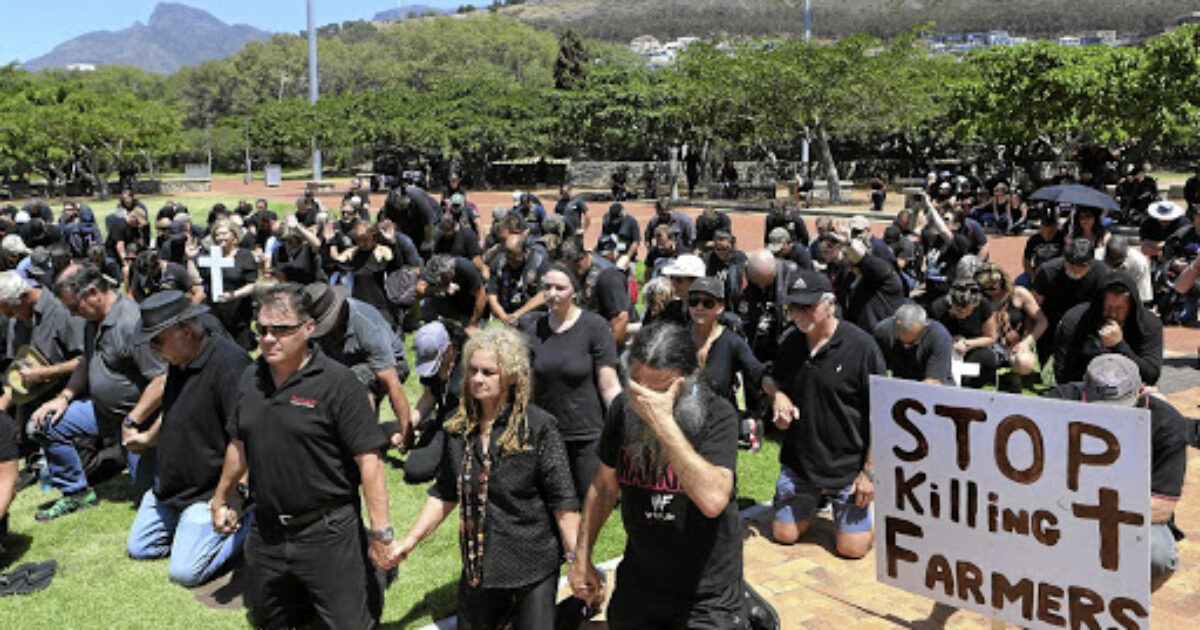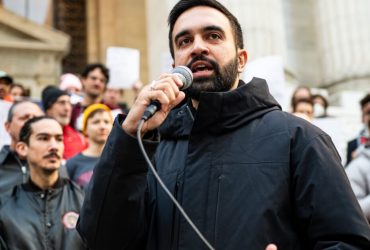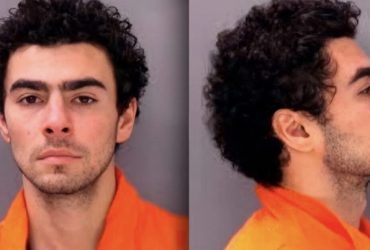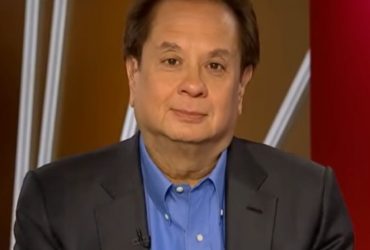October 30, 2017. Cape Town. People pray during “Stop the farm killings” demonstration at Green Point stadium. Photo by Ruvan Boshoff
President Trump has once again come under fire for admitting White South Africans to the United States under claims of genocide. So far, 59 White South Africans have been granted asylum in the U.S., citing racial persecution and violence.
The same media and politicians who want deported MS-13 gang members returned to the U.S. have decided that there is no genocide in South Africa. While no international court has formally declared it a genocide, and the legal threshold for such a designation is high, the facts on the ground are difficult to ignore: white South Africans are being persecuted. They face the constant threat of violence, along with a legal framework that restricts their career opportunities and threatens to strip them of their land.
South Africa has one of the highest murder rates in the world, and at least half a million people have been murdered in South Africa since the end of apartheid. Some sources claim that as many as a quarter of those victims, particularly in the early years of the current system, were White. However, this claim has been difficult to verify due to the lack of race-disaggregated data in official crime reports.
Attacks on White-owned farms, including theft, rape, assault, and murder, are well documented. Since 1994, there have been approximately 3,398 farm murders, many involving white farmers. In 2024 alone, South Africa recorded nearly 20,000 homicides, including 32 farm-related murders and 256 farm attacks, most of which targeted White farming families. These numbers point to a disproportionate threat faced by White South Africans.
Some South African political figures, such as Julius Malema of the Economic Freedom Fighters (EFF), have made inflammatory statements about land redistribution. Malema has positioned the EFF as a radical alternative, accusing the ruling ANC of failing to address inequality and the transfer of land from White to Black South Africans. He is known for his incendiary rhetoric, including remarks about arming Hamas, singing “Shoot the Boer,” and making statements widely seen as threatening to white South Africans.
Beyond physical violence, white South Africans also face institutionalized discrimination through race-based laws and policies that enforce racial quotas in hiring and promotions, effectively excluding them from many public and private sector opportunities. In addition, land redistribution legislation threatens the possibility of White-owned farms being seized without compensation.
The Broad-Based Black Economic Empowerment (BBBEE) Act rewards companies with higher scores based on Black ownership, management, employment, and procurement from Black-owned businesses. As a result, White-owned businesses often struggle to compete for government contracts or major private sector deals unless they relinquish control or ownership. White entrepreneurs may be excluded from grants, loans, and partnerships because they do not contribute to BBBEE scorecards, limiting economic opportunities, especially for those without political connections or existing wealth.
The Employment Equity Act and its 2025 Amendment require companies to meet racial quotas in hiring and promotions, tied to national and regional demographics. The amendment introduced stricter enforcement and penalties, pressuring employers to favor racial targets over merit. In provinces where Whites make up a small minority, White applicants, regardless of qualifications, can be legally passed over, particularly in civil service and state-owned enterprises.
In South African Police Service v Barnard (2014), the Constitutional Court upheld a decision not to promote a White female officer, Renate Barnard, despite her being the top candidate, because her promotion would have disrupted racial representational goals. This ruling set a precedent that race can legally override merit in public sector advancement, reinforcing systemic barriers for qualified white professionals.
As of recent reports, white South Africans, who make up about 8% of the population, own approximately 72% of privately held farmland. Consequently, the South African government has implemented land reform initiatives, including land restitution and redistribution programs. While expropriation without compensation has been debated, and isolated incidents of land occupation have occurred, a systematic campaign against White farmers has not yet materialized.
However, in 2024, the legal groundwork for such actions was established.
The Expropriation Act of 2024 allows the government to seize private land without compensation under certain “public interest” conditions, such as land reform. Although race-neutral in wording, the political and policy focus overwhelmingly targets land owned by White South Africans due to apartheid-era patterns. As a result, White farmers face legal uncertainty, diminished investment confidence, and the threat of losing their land without recourse.
While some defend these laws as corrective measures for apartheid-era injustices, they function today as legally sanctioned discrimination against a racial minority. Whether or not the violence and systemic marginalization qualify as genocide under international law, the threat is real. These conditions clearly meet the standards for asylum under U.S. and international law.
The post Genocide Against White South Africans, Facts and Number appeared first on The Gateway Pundit.











